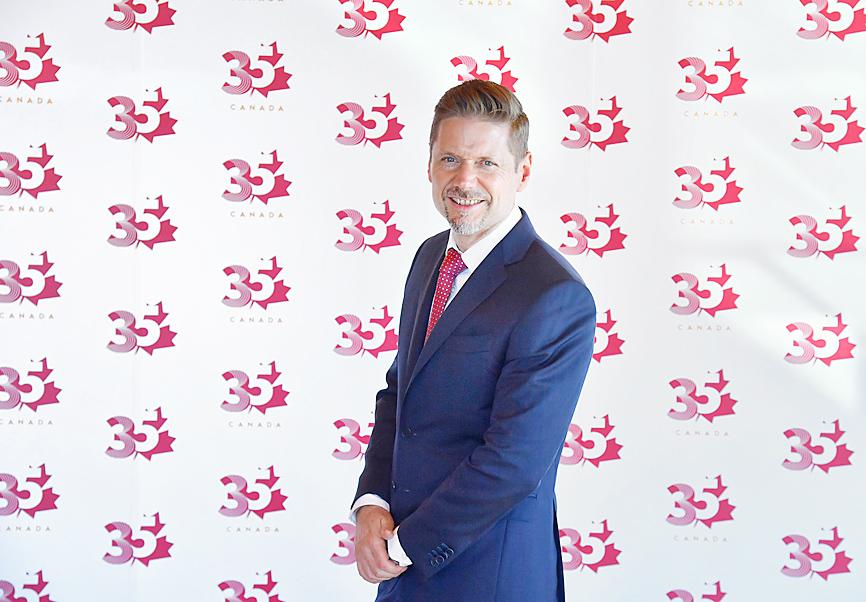Canada’s de facto embassy is celebrating its 35th anniversary in Taiwan this year, having witnessed the nation’s democratic transformation amid growing cooperation between Taipei and Ottawa in multiple areas, Canadian Trade Office in Taipei (CTOT) Executive Director Jordan Reeves said.
CTOT represents Canada’s interests in Taiwan in the absence of official diplomatic ties.
“We’re celebrating CTOT’s 35th year, but we’re also celebrating Taiwan’s successful transition to a high-tech democratic society, because this has certainly contributed to the richness and diversity of our people-to-people ties today,” Reeves said.

Photo: CNA
CTOT opened on Nov. 28, 1986, with only three employees and a goal of supporting bilateral exchanges and Canadians living in Taiwan, he said.
“At the time, there were no direct flights to Canada, bilateral trade was only C$1.6 billion [US$1.25 billion] and of course, Taiwan at that time was still under martial law,” he said.
Since then, Taiwan has changed a great deal. It has become a democracy, with its first direct presidential election held in 1996, he said.
“Taiwan has also made enormous strides in terms of gender equality, human rights, democratic governance, media freedom, all these areas, and has become a very trusted friend and trading partner for Canada,” Reeves said.
Trade between the two countries was valued at C$7.5 billion in the first nine months of the year, he said, adding that trade has increased 10 percent annually since the office opened.
Today, three airlines offer direct flights between Taiwan and Canada, although most have been suspended due to the COVID-19 pandemic.
Reeves said that since 1986, the two countries have signed 40 memorandums of understanding in areas ranging from agricultural science to transportation and safety, with 28 still in place.
“You can say that the expansion of our office, our size and responsibilities have also very closely tracked Taiwan’s transition to a vibrant and economically diverse, inclusive society,” he said.
Naming one area of close bilateral cooperation, Reeves said Taiwan’s national health insurance scheme, launched in 1995, was partly modeled on Canada’s universal healthcare system.
More recently, Canadian public health officials have participated in discussions with Taiwan’s Ministry of Health and Welfare to learn from Taiwan how to best control and manage COVID-19, he said.
Another area of cooperation is on indigenous issues, and the two countries have for two decades organized exchanges and collaboration between indigenous leaders, policymakers and artists, Reeves said.
“We also started, back in 2010, a working holiday program for Taiwanese youth, and under that program to date, 12,000 Taiwanese youth have visited Canada,” he said.
Looking to the future, Reeves said that the latest round of the annual Canada-Taiwan economic dialogues, held on Dec. 14, would bolster supply chain cooperation, and deepen bilateral trade and investment ties, with plans to undertake a joint supply chain study in sectors of mutual interest.
The two countries also discussed organizing a series of business roundtables beginning next year focused on electric vehicles, 5G, advanced manufacturing and other areas, a CTOT news release said.
Taiwan was Canada’s 15th-largest trading partner and its sixth-largest in Asia last year, CTOT said.

Chinese spouse and influencer Guan Guan’s (關關) residency permit has been revoked for repeatedly posting pro-China videos that threaten national security, the National Immigration Agency confirmed today. Guan Guan has said many controversial statements in her videos posted to Douyin (抖音), including “the red flag will soon be painted all over Taiwan” and “Taiwan is an inseparable part of China,” and expressing hope for expedited reunification. The agency last year received multiple reports alleging that Guan Guan had advocated for armed reunification. After verifying the reports, the agency last month issued a notice requiring her to appear and explain her actions. Guan

GIVE AND TAKE: Blood demand continues to rise each year, while fewer young donors are available due to the nation’s falling birthrate, a doctor said Blood donors can redeem points earned from donations to obtain limited edition Formosan black bear travel mugs, the Kaohsiung Blood Center said yesterday, as it announced a goal of stocking 20,000 units of blood prior to the Lunar New Year. The last month of the lunar year is National Blood Donation Month, when local centers seek to stockpile blood for use during the Lunar New Year holiday. The blood demand in southern Taiwan — including Tainan and Kaohsiung, as well as Chiayi, Pingtung, Penghu and Taitung counties — is about 2,000 units per day, the center said. The donation campaign aims to boost

The Kaohsiung Tourism Bureau audited six hotels in an effort to prevent price gouging ahead of Korean band BTS’ concert tour in the city scheduled for Nov. 19, 21 and 22 this year. The bureau on Friday said that the audits — conducted in response to allegations of unfair pricing posted on social media — found no wrongdoing. These establishments included the local branches of Chateau de Chine, Hotel Nikko, My Humble House, and Grand Hai Lai, it said, adding that the Consumer Protection Commission would have penalized price gougers had the accusations been substantiated. The bureau said the Tourism Development Act

BACK TO WINTER: A strong continental cold air mass would move south on Tuesday next week, bringing colder temperatures to northern and central Taiwan A tropical depression east of the Philippines could soon be upgraded to be the first tropical storm of this year, the Central Weather Administration (CWA) said yesterday, adding that the next cold air mass is forecast to arrive on Monday next week. CWA forecaster Cheng Jie-ren (鄭傑仁) said the first tropical depression of this year is over waters east of the Philippines, about 1,867km southeast of Oluanpi (鵝鑾鼻), and could strengthen into Tropical Storm Nokaen by early today. The system is moving slowly from northwest to north, and is expected to remain east of the Philippines with little chance of affecting Taiwan,